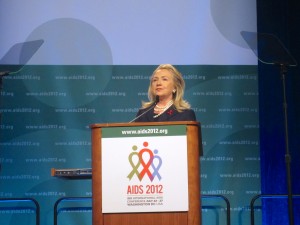Reported from Washington D.C. for Cleveland.com (The Plain Dealer) with accompanying photo slideshow and video: http://www.cleveland.com/healthfit/index.ssf/2012/07/international_aids_conference_1.html
By Casey Capachi
WASHINGTON, D.C. — Thousands of Medical professionals, policy makers, and advocates for those living with HIV/AIDS came out on Monday for the first full day of programming at the 19th International AIDS Conference to “Turn Back the Tide of the Epidemic.”
Secretary of State Hillary Rodham Clinton, Bill Gates, and Elton John all spoke of the road ahead for connecting the communities most affected by the virus with the care they need.
For Elton, an openly gay public figure, the cause was personal. He watched many of his friends die of AIDS in the 1980s. “By all rights, I shouldn’t be here,” he told the crowd of his self-destructive lifestyle as a former drug addict.

There are nearly two dozen delegates from Cleveland in attendance, HIV/AIDS community advocates, who say they hope to bring back what they learn over the week-long conference.
“I’m most excited about going because we haven’t had an international conference forever because of the immigration ban on HIV positive people,” said Naimah O’Neal, 49, of Euclid who will be volunteering at the conference. “I will be going to all the workshops that relate to women.”
The Global Village, a space open to the public, which features advocacy groups and vendors selling wares and ideas from around the world celebrated its opening on Monday with live shows starting with Jamar Rogers, a HIV-positive contestant from NBC’s “The Voice” and closing with a Brazilian samba dance group beating drums, which proceeded to parade around the perimeter of the village, picking people up along the way.
Amid the fanfare, Julie Patterson, of Northeast Ohio, met with fellow AVAC (AIDS Vaccine Advocacy Coalition) PxROAR program advocates, focusing on HIV prevention in their local communities. Patterson said it was inspiring to hear what other advocates from across the country were working on as well as from others from abroad who found the event in the programme.
“One of things is that we’re not one of the “twelve cities” they talk about in studies. If you’re in the next tier down it’s hard to tap in,” Patterson told the group, many of whom nodded along in agreement about the struggle to make HIV prevention seen as a priority in their communities.
Several researchers from Case Western Reserve University (CWRU) are preparing for their presentations at the end of the week. Their work ranges from the biological to the social aspect of treating patients with HIV, who are now living increasingly longer lives.
CWRU-Uganda Research collaboration, will also be contributing to one of the biggest conversations at the conference – how best to reduce the spread of HIV/AIDS in Africa, which is the continent most affected by the virus.
“I lived for a long time in Uganda before there was medicine for HIV/AIDS, so I saw the effect both among family members as well as friends,” said David Kaawa-Mafigari of CWRU whose poster presentation at the conference talked about the difficulties poor patients in rural areas of Uganda have when accessing care such as with transportation. Dr. Janet McGrath of CWRU, who worked alongside Kaawa-Mafigiri spoke in a workshop on CWRU’s research in Uganda.
“People are excited to be in DC and learn new things about how to prevent and treat HIV and make sure the funding is still there,” said conference attendee Dr. Jennifer Furin, who focuses on Tuberculosis and HIV co-infection, at CWRU. “And to remember that there are over 33 million people out there who are still infected.”
Follow Plain Dealer reporter Casey Capachi at the International AIDS Conference on Twitter: @caseycapachi